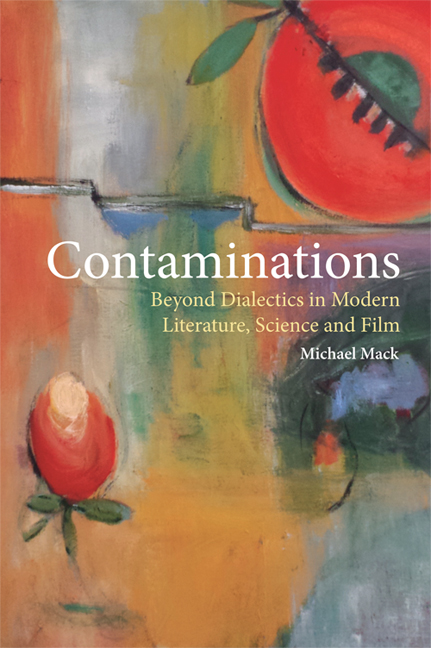Book contents
- Frontmatter
- Contents
- Acknowledgements
- Dedication
- Introduction: Climate Change and the Contamination of the Anthropocene
- 1 Contaminating Psychology with Biology: Descartes, Spinoza, Freud and Žižek
- 2 Contaminating the Visible with the Invisible: From Einstein via H. G. Wells to Hannah Arendt, Luhmann and Derrida
- 3 Contamination of Nature with Society: The Collapse of Natural Order from Melville to Wells and Ellison
- 4 Contaminating Judgement with its Suspension: Guilt and Punishment in Walter Benjamin, Herman Melville and Henry James
- 5 Contaminating the Digital: Action and Perception in Henry James and Alfred Hitchcock
- 6 Contaminating the Sacred with the Profane: Pier Paolo Pasolini and Biopolitics
- 7 Contaminating Posthumanism
- Bibliography
- Index
5 - Contaminating the Digital: Action and Perception in Henry James and Alfred Hitchcock
Published online by Cambridge University Press: 05 August 2016
- Frontmatter
- Contents
- Acknowledgements
- Dedication
- Introduction: Climate Change and the Contamination of the Anthropocene
- 1 Contaminating Psychology with Biology: Descartes, Spinoza, Freud and Žižek
- 2 Contaminating the Visible with the Invisible: From Einstein via H. G. Wells to Hannah Arendt, Luhmann and Derrida
- 3 Contamination of Nature with Society: The Collapse of Natural Order from Melville to Wells and Ellison
- 4 Contaminating Judgement with its Suspension: Guilt and Punishment in Walter Benjamin, Herman Melville and Henry James
- 5 Contaminating the Digital: Action and Perception in Henry James and Alfred Hitchcock
- 6 Contaminating the Sacred with the Profane: Pier Paolo Pasolini and Biopolitics
- 7 Contaminating Posthumanism
- Bibliography
- Index
Summary
‘their feeling as their doing’
Henry James, preface to The Princess CasamassimaIntroduction: acceleration from the Industrial Revolution to the high modernity of our digital culture
Strether is a spectator. As such, he is a theoretical person: according to its Greek etymology, theory is a form of spectatorship. Perception, however, does not exclude praxis. On the contrary, James's writing and thought contaminates the practical with the theoretical. Rather than preventing an active life, Strether's theoretical bent slows down his actions and in doing so renders them more thoughtful. James's back and forth between perception and action, between meaning and deed has a special pertinence for our contemporary digital culture, which accentuates the blurring of the difference between audience and production. As George Dyson has recently argued, Von Neumann invented digital software when he and Turing instigated numbers not only to mean but to do things:
‘“Words” coding the orders are handled in the memory just like numbers,’ explained Von Neumann, breaking the distinction between numbers that mean things and numbers that do things. Software was born. Numerical codes would be granted full control – including the power to modify themselves. (Dyson 2012: 64)
Once the computer was invented in the 1940s, ‘numbers would assume a life of their own: numerical organisms were replicated, nourished, and rewarded according to their ability to go out and do things: they performed arithmetic, processed words, designed nuclear weapons, and accounted for money in all its forms’ (Dyson 2012: 239). Our digital culture places a premium on actions, on doing. Actions are, however, more quickly and more efficiently performed by machines than by humans.
Questions of hermeneutics increasingly give way to the startling performance of computer-generated efficiency. Computers read faster than a human could ever read. As Dyson has pointed out, however, ‘reading does not imply understanding’ (Dyson 2012: 313). Speed does not necessarily coincide with intelligence. Infinite streams of information do not ensure that what is transmitted can also be understood:
Through large-scale statistical, probabilistic information processing, real progress is being made on some of the hard problems, such as speech recognition, language translation, protein folding, and stock market prediction – even if only for the next millisecond, now enough to complete a trade. How can this be intelligence, since we are just throwing statistical, probabilistic horsepower at a problem, and seeing what sticks, without any underlying understanding?
- Type
- Chapter
- Information
- ContaminationsBeyond Dialectics in Modern Literature, Science and Film, pp. 129 - 158Publisher: Edinburgh University PressPrint publication year: 2016



